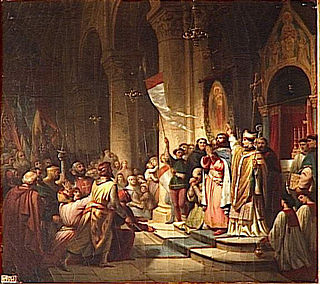Related Research Articles

Year 1206 (MCCVI) was a common year starting on Sunday of the Julian calendar.

The Fourth Crusade (1202–1204) was a Latin Christian armed expedition called by Pope Innocent III. The stated intent of the expedition was to recapture the Muslim-controlled city of Jerusalem, by first defeating the powerful Egyptian Ayyubid Sultanate, the strongest Muslim state of the time. However, a sequence of economic and political events culminated in the Crusader army's 1202 siege of Zara and the 1204 sack of Constantinople, the capital of the Greek Christian-controlled Byzantine Empire, rather than Egypt as originally planned. This led to the partitioning of the Byzantine Empire by the Crusaders.

Baldwin I was the first Emperor of the Latin Empire of Constantinople; Count of Flanders from 1194 to 1205 and Count of Hainaut from 1195-1205. Baldwin was one of the most prominent leaders of the Fourth Crusade, which resulted in the sack of Constantinople in 1204, the conquest of large parts of the Byzantine Empire, and the foundation of the Latin Empire. He lost his final battle to Kaloyan, the emperor of Bulgaria, and spent his last days as his prisoner.

Henry was the second Latin emperor of Constantinople. He was one of the leaders of the Fourth Crusade in which the Byzantine Empire was conquered and Latin Empire formed.

Peter, also Peter II of Courtenay, was emperor of the Latin Empire of Constantinople from 1216 to 1217.

The Latin Empire, also referred to as the Latin Empire of Constantinople, was a feudal Crusader state founded by the leaders of the Fourth Crusade on lands captured from the Byzantine Empire. The Latin Empire was intended to replace the Byzantine Empire as the Western-recognized Roman Empire in the east, with a Catholic emperor enthroned in place of the Eastern Orthodox Roman emperors.
Theodore Branas or Vranas, sometimes called Theodore Komnenos Branas, was a general under the Byzantine Empire and afterwards under the Latin Empire of Constantinople. Under the Latin regime he was given the title Caesar and in 1206 he became governor and lord of Adrianople. He is called Livernas by western chroniclers of the Fourth Crusade, including Geoffroi de Villehardouin.

Theoderic, commonly known as Thierry of Alsace, was the fifteenth count of Flanders from 1128 to 1168. With a record of four campaigns in the Levant and Africa, he had a rare and distinguished record of commitment to crusading.
Philip I, commonly known as Philip of Alsace, was count of Flanders from 1168 to 1191. During his rule Flanders prospered economically. He took part in two crusades and died of disease in the Holy Land.
Eustace I Granier, also known as Eustace Grenier or Eustace Garnier, called in Latin Eustachius Granarius in the charters, was a Flemish crusader who took part in the First Crusade. He became lord of Caesarea in 1101 and lord of Sidon in 1110. On 18 April 1123, he was elected constable and bailiff of Jerusalem during the captivity of Baldwin II of Jerusalem. Shortly before his death, he defeated a Fatimid army at the Battle of Yibneh near Ibelin.
Eustace Grenier is quoted in a text in verse written during his life in honour of the knights of the diocese of Thérouanne who accompanied Baldwin of Boulogne to the Holy Land.
Contemporary authors and historians identify Eustace Grenier as a nobleman from the diocese of Thérouanne in the County of Saint-Pol. Alan V. Murray, historian of the Crusades, writes: "However, his origins can be established with a high degree of certainty. The Versus de viris illustribus diocesis Tarvanensis qui in sacra fuere expeditione identifies him as a Fleming from the diocese of Therouanne".
Conon de Béthune was a French crusader and trouvère poet who became a senior official and finally regent of the Latin Empire of Constantinople. Alternative spellings of his name include Cono, Coesnes, Quenes, Conain, and Quenon.

The Bulgarian–Latin wars were a series of conflicts between the Second Bulgarian Empire (1185–1396) and the Latin Empire (1204–61). The wars affected the northern border of the Latin Empire throughout its existence.

The battle of Rusion occurred in the winter of 1206 near the fortress of Rusion between the armies of the Bulgarian Empire and the Latin Empire of Byzantium. The Bulgarians scored a major victory.

The House of Flanders—also called the Baldwins —was a medieval ruling family that was founded by Baldwin Iron Arm, son-in-law of Charles the Bald.

William II, Lord of Béthune, nicknamed William the Red was French nobleman. He was a ruling Lord of Béthune, Richebourg and Warneton, as well as hereditary advocatus of the Abbey of St. Vaast, near Arras.
Anseau de Cayeux or Anselm de Cayeux was a French knight from Picardy, who participated in the Fourth Crusade (1202-1204) and later became one of the leading nobles of the Latin Empire, serving as regent in Constantinople (1237-1238). He was married to Byzantine princess Eudokia Laskarina, younger daughter of former emperor Theodore I Laskaris.
Daniel I of Adelon or Daniel of Termonde was Lord of Adelon in the Kingdom of Jerusalem.
Thierry de Loos was a Franco-Flemish nobleman who took part in the Fourth Crusade and afterwards became prominent within the Latin Empire.

Jean de Béthune, a member of the noble House of Bethune, was a French cleric who became the Roman Catholic bishop of the diocese of Cambrai and ruler of the principality of Cambrésis in the Holy Roman Empire.
Thierry of Flanders was a Flemish nobleman and crusader active in 1197–1207.
References
- 1 2 3 du Fresne 1971, p. 69.